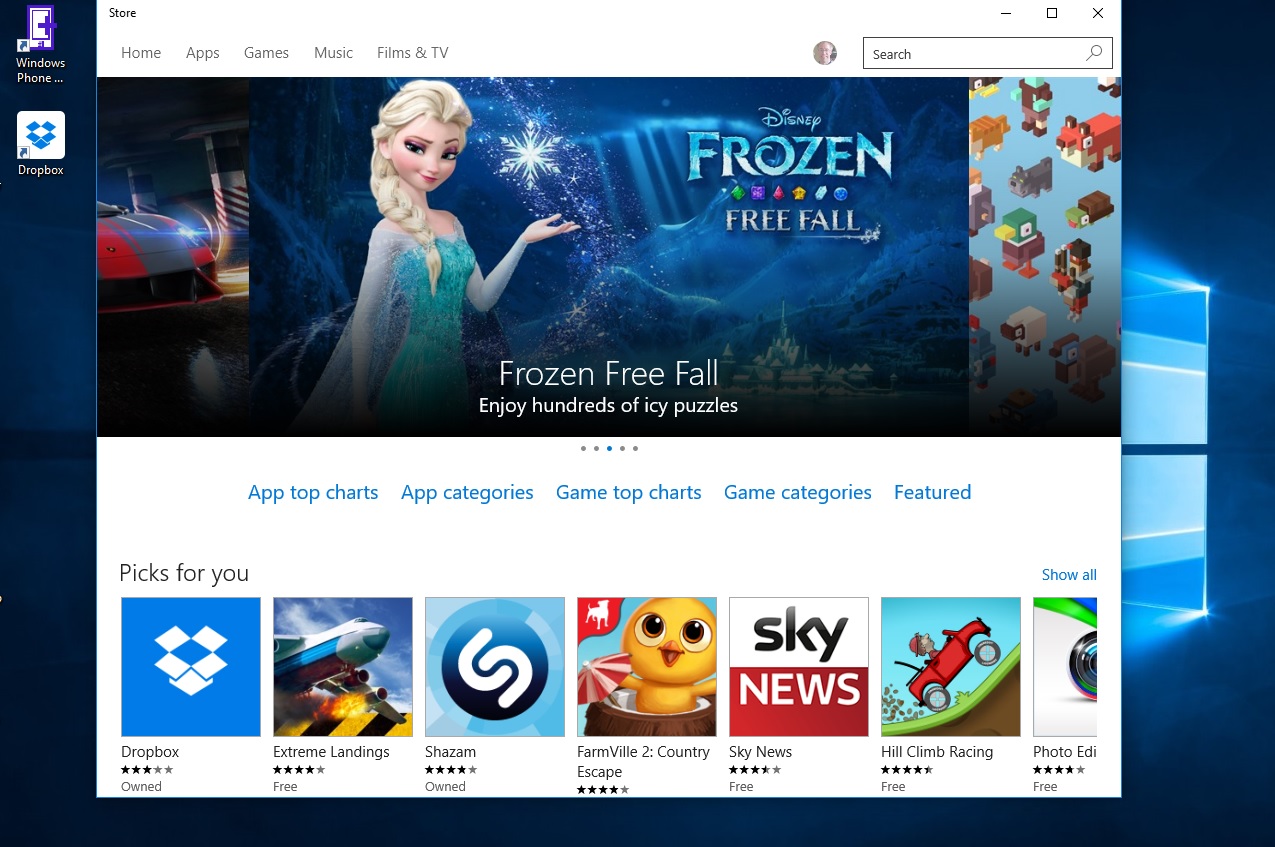I've written before at length about the benefits of Windows Phone joining in with the desktop as part of the whole, unified Windows 10 platform and experience:
- Universal applications, developers can write once and deploy to desktops, laptops, tablets and (importantly) phones.
- People will enjoy the new (free) Windows 10 and will be more enticed to give the mobile version the time of day in High Street shops.
It's a wonderful vision. And most of it will happen. Developers can indeed create Universal applications - there's a growing selection already. And people are already enjoying Windows 10 on their desktops and laptops, from all accounts, and may well give a mobile version more of a glance in phone shops over the next couple of years.

However, the success of Windows 10 Mobile, other than as a 'look what we can do with Windows 10, we made it run on a phone' series of concept devices from Microsoft, will ultimately come down to third party applications and services in the eyes of every day users. Much of the online world is already covered, albeit often with third party replacements for third party services (think YouTube or Instagram), but for Windows 10 Mobile to be taken seriously, into 2016 and beyond, then it has to have all of the online world covered. And yes, this includes Google services like Hangouts, YouTube, Gmail and Google Drive.
This isn't a problem in the real world of 2015, of course, PC users access these every day of the year on their machines. The issue is that, in the opposite fashion to how things are done on smartphones and tablets, the vast, vast majority of things people 'do' (to use Microsoft's own verb of the moment!) on desktop and laptops aren't done in third party applications at all.
Just think for a minute about how, on your Windows PC/laptop, you access the likes of Gmail, Outlook email, OneDrive, Google Drive, Netflix, Amazon, Facebook and even Twitter. And a hundred other examples. You almost certainly use a web browser for almost everything, with multiple tabs open. Whether it's Microsoft Edge, Internet Explorer, Chrome (the market leader) or Firefox, the vast majority of things people 'do' on a PC nowadays tend to happen inside a browser window.
Which means that, however well stocked the Windows Store is on the PC, it's perhaps only going to be of tangential interest to the man in the street. I've observed family here with Windows 8.1, also with a Store, and have never once seen them access it or use any application derived from it. Ever. If they want to access something they Google it (or use a toolbar shortcut) and then use it in their browser. At most, there might be a download involved from a web site, e.g. for iTunes or Spotify, applications which then get installed independently of the platform's Store. In either case, there has been no real incentive or push to discover Store content on the desktop/laptop, meaning that there's potentially no tie-in to to the same applications accessed from the same Store and ostensibly on the same platform on 'Mobile'.
Now, Microsoft is - obviously - pushing the Store a LOT more in Windows 10 (which is only three days old as I write this!), not least as the avenue for update for many core Windows built-in applications. So users will be seeing Store content from day to day, which is a good thing. But I do worry that it's not going to be enough, aside from the odd franchise game or two (we've been playing Minion Rush!), to change the user habits of a decade.
I've often said, in a mobile context, that you don't need applications for an awful lot of content and services, since a web browser is good enough and sites usually provide a friendly experience to phones. Now, obviously, dedicated applications will provide an even better experience, but are they worth users seeking out? On a smartphone, probably yes, where available - witness the success of 'apps' in the iOS and Android world - on a desktop/laptop, probably not.
Most people are now very familiar (and happy) with their favourite online properties (again, think Gmail, Netflix, Facebook, etc.) neatly framed by a browser window - and I'm struggling to think of compelling reasons why users might prefer to seek out dedicated applications, download and install them, pin them to the right point on their desktop and/or Start menu, and then navigate again via Start in order to get back to them. How is that better, for the man in the street, than simply using a new tab in a web browser which he or she already has open?
Apologies if this is all straying too far from Windows Phone and mobile, but it's all ultimately relevant. If the Store on Windows 10 on desktops and laptops proves a wild success then there's every chance that the ecosystem and its developers will grow further and Mobile will benefit as a result. If peoples' habits don't change though, then there really isn't much incentive to even acknowledge the existence of 'Universal' applications for Windows 10, however clever it is technically. Meaning, in turn, that there isn't much incentive to acknowledge the existence of Windows 10 Mobile.
PS. Much of what I've written about has been applications. As the main screenshot depicts, leisure titles and games are a big part of an 'app store' on any platform - will these also evolve to become universal, in a big way, giving people a buy once, play anywhere gaming facility, including on smartphones? After all, Microsoft does own Xbox as well...
PPS. Of course, there are other reasons to choose Windows Phone/Windows 10 Mobile, there really are some things it does better than iOS and Android.
